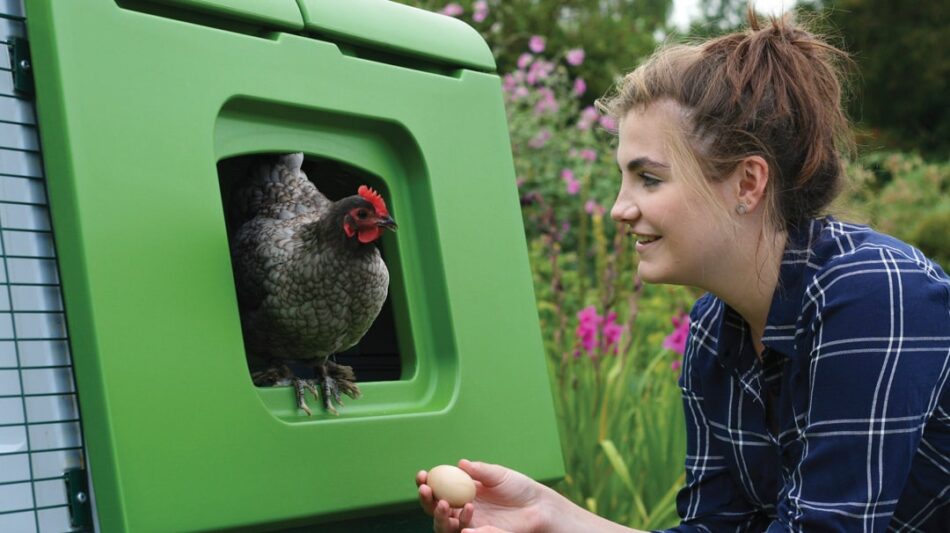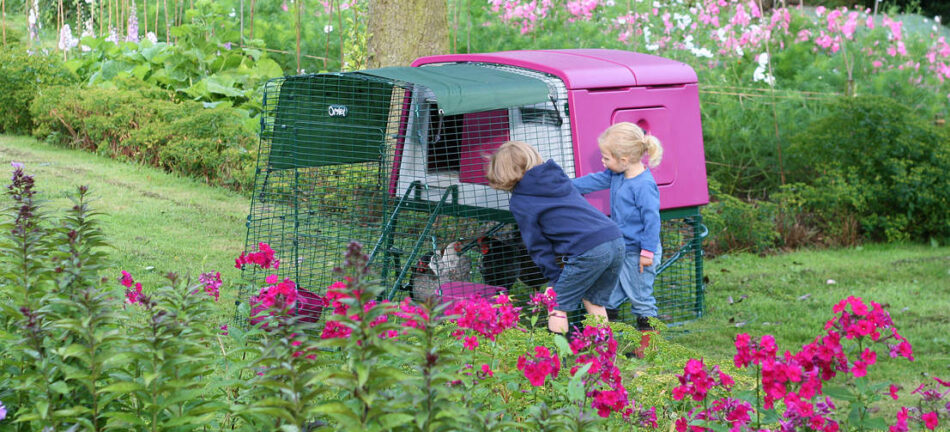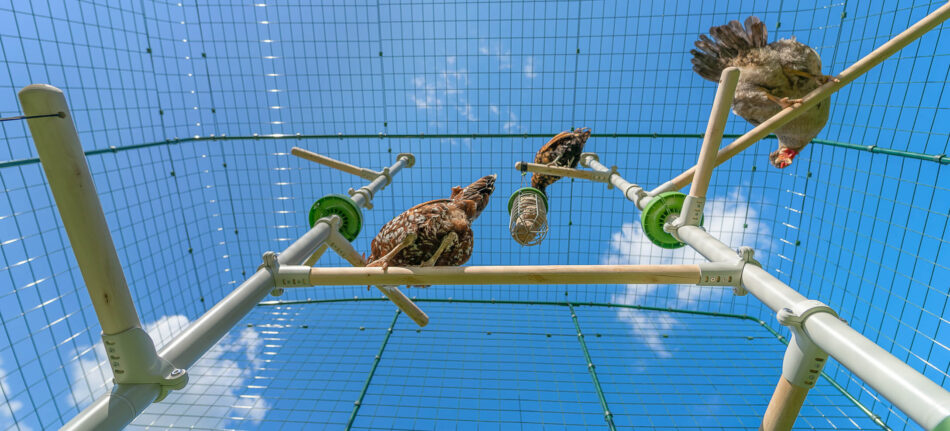Making a House a Homestead: The Benefits of Keeping Chickens
Did you know that chickens were domesticated thousands of years ago? Our favourite egg-laying friends have been part of farming practices since 2000-1500 BC! Long praised for their plumage, egg laying efficiency and ease of care, chickens are kept all over the world in backyards and barnyards alike.
But what else do chickens have to offer? What are the benefits of owning chickens?
Fresh eggs
It’s true that most people acquire chickens to have fresh eggs on a regular basis. Chickens have provided humans with delicious protein-packed cackleberries for centuries. In fact, different breeds of chickens have emerged over the years to enhance both egg production and egg composition. Through selective breeding, hens are capable of laying not only white eggs, but brown, blue, green, and even pink eggs!
Good laying hens can produce 5-6 eggs per week. They start laying when they are about 18 weeks old (although this can vary between breeds, with some breeds not reaching laying-age until 6 months), and will continue to lay eggs until they are 5 or 6 years old. A well-kept and fed backyard hen can lay up to 250 in the first year! Eggs start off small and elongated, but once a hen has some successful egg-laying-sessions under her belt, the eggs will be larger and more shapely. You can’t expect her to keep going at this rate though! Your hen will slowly taper off her egg production to about 80% in her second year, with a decrease of around 10% thereafter. That means if she laid 250 eggs her first year, the second year would yield around 200 eggs. Year three would yield around 175, and so forth.
Some of the best egg-producing breeds include: Rhode Island Reds, Plymouth Barred Rocks and Buff Orpingtons. If colourful eggs are what you seek, breeds such as Ameraucana Marans, Barred Rocks, and Welsummers. Some popular cross-breeds have been developed for egg colouration, and go by the common names of “Easter Eggers” or “Olive Eggers.”
Even chickens that are considered low-egg producers can still lay 2-4 eggs per week. As long as hens are happy and healthy, you’ll be provided with a steady stream of fresh eggs to enjoy!
Pest control
Say goodbye to pests without calling the exterminator – just let your chickens take care of the creepy crawlies! Your flock will feast on just about every bug that plagues your yard. Ants, hookworms, moths, grasshoppers, ticks, centipedes, termites, spiders, and even scorpions are on the menu for chickens.
Insects are an excellent source of protein for your hens, and chasing bugs is enriching for them and entertaining for you! You’ll notice your chickens’ inner dinosaur (they are related, after all!) on display as they zoom around the yard after a wayward grasshopper or moth.
Feathers
Yes, we said feathers! Eggs get the most attention, and while they are definitely fun to look at, chickens have other visually appealing products of their nature.
Chicken plumage comes in a wide array of beautiful colours and patterns. Along with regular feather-loss, chickens moult once a year, which means they shed the majority of their feathers. The result is a DIY dream come true! Hop onto Pinterest for some amazing feather craft ideas, or design your own stunning arrangements. The best part? You don’t have to worry about them spoiling!
City chickens or country chickens
Did you know that many cities allow chickens in backyards? That means you can likely have a small flock of chickens and experience a small portion of farm life – right in your own neighbourhood!
Coops that will fit most backyard spaces include: the Eglu Go Up Chicken Coop or Eglu Go Chicken Coop. For larger spaces or flocks, the Eglu Cube Chicken Coop is the best choice. We’ve designed our entire line of Eglu Coops to be the whole package: a complete setup to fit into any space, large or small. Just imagine: what if you could enjoy life on a farm, right in the centre of town?
Be sure to check with your local ordinances, as most cities prohibit roosters, and have space requirements between coops and other homes.
Learning opportunities
Chickens are fascinating animals. They have social hierarchy within a flock, natural instincts to be observed, and provide eggs that can be utilized in multiple ways.
You’ll often see a “leading lady” among your flock that seems to call the shots! Other hens will move in submission to a dominant hen. If you have a rooster, he may act like a big deal, but there’s usually a hen behind him keeping him in line! Most animals that live in flocks, packs or herds have a social hierarchy, but observing your backyard flock is one of the best ways to understand the social network of creatures that live in groups.
The natural instincts of chickens are similar to their wild-counterparts. The closest-related wild animal to chickens are “junglefowl”, which can be found in the jungles of Southeast Asia. And going farther back, chickens have recently been linked to a famous ancestor: the T-Rex! So by watching your chickens scratch and peck the ground, chase insects, spar with each other, and lay eggs on a schedule, you’re actually witnessing instinctual behaviours shared with wild animals and long-extinct dinosaurs!
Eggs aren’t just for eating. Have you ever thought about incubating eggs? Small incubators can be purchased for home-hatching. Chicks hatch after just 21 days in an incubator, which makes incubating eggs an excellent home biology lesson. And by purchasing an egg candler, you can mark the progress of the chicks inside the egg. Children and adults alike will be mesmerized by this process! Eggs can also be displayed on your countertop for several weeks (if they are unwashed), or can be preserved by “glassing” in an air-tight container for display and future use.
Composting companions
Are you tired of turning your compost pile? Let your chickens help! By giving your birds access to your compost piles, they’ll help the process along by keeping it bug-free and routinely turned. And while chicken poop might not be the most appealing part of having a flock, it’s actually great fertilizer! While your chickens scratch around in your compost, they’ll leave their own contribution!
Be sure to not let chickens have access to the compost until food scraps, coffee grounds, or other additives are decomposed to ensure they don’t ingest something harmful.
Lawn ornaments
People have long decorated their lawns with various sculptures, statues, and other decor. Why not add living art to your decorating scheme?
Chickens come in a wide array of colours and sizes, and even have different textured feathers! Choose Silkies, Frizzles, or Polish to add some fun texture to your flock. Breeds such as Barred Rocks, Laced Wyandottes, or Mille Fleurs will add a pop of colour to your yard that will rival any artificial accessory!
Much like keeping an aquarium, chickens add a beautiful and natural focal point to your home. And unlike fish, most chicken breeds get along with others, so mix and match to your heart’s content!
A backyard play-space
Chickens are naturally inquisitive and active! Create a backyard play space for them to foster their natural curiosity. Some fun and entertaining options include: the Chicken Swing, Freestanding Chicken Perch, PoleTree, or chicken toys.
Like kids at a park, your chickens will get a thrill out of swinging, perching, pecking, and hopping around their own playground. Add some chicken-safe potted herbs or other plants for even more stimulating play!
Affordable
Chickens are one of the most cost-effective pets to own. They are inexpensive to obtain, and if free-ranging is an option, feed costs are kept to a minimum. If a flock is contained to a coop and run, a combination of quality pellets and scratch will keep them well fed and happy. Chicken treats are a great way to incorporate some free-range finds into a cooped-up flock. Additional inexpensive diet add-ins include lettuce, fruits and vegetables.
When you consider all of the benefits chicken-ownership has to offer, the return on investment is high! Fresh eggs, lawn care, pest control, entertainment, education, and companionship are just a few of the joys that come with caring for a flock of chickens.
What are some of the benefits of owning chickens that you have experienced? We’d love to hear from you!
This entry was posted in Chickens



One reply on “Making a House a Homestead: The Benefits of Keeping Chickens”
My hens are also very affectionate and will jump up for a cuddle. They make such soothing sounds I always feel very relaxed and happy in their company. Jeannie, my Border Collie is their guardian and they all have such a heartwarming relationship. I cannot recommend keeping chickens passionately enough. I’m living the dream with Jeannie and my seven girls.